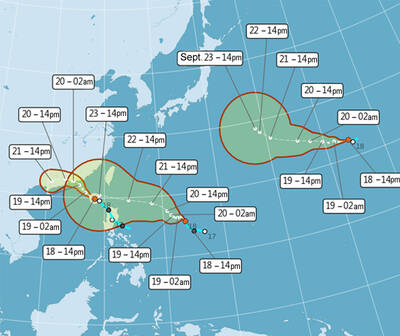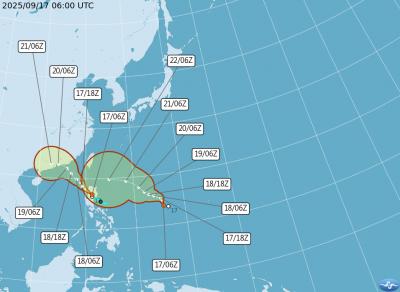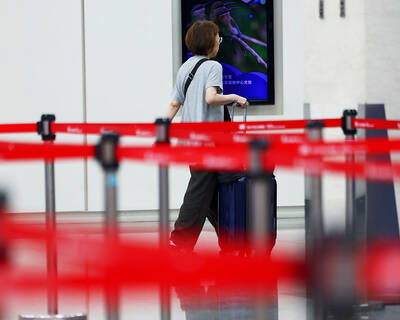Minister of Transportation and Communications Mao Chi-kuo (毛治國) said yesterday that several of the items in the agreement signed yesterday by the Straits Exchange Foundation and the Association for Relations Across the Taiwan Strait (ARATS) on increasing the number of cross-strait charter flights had “exceeded the ministry's expectations.”
According to the Statute Governing the Relations Between the Peoples of the Taiwan Area and the Mainland Area (兩岸人民關係條例), the agreement has to be reviewed by the legislature first.
While the agreement will take effect within 40 days after it is signed, the statute also provides that the agreement would automatically take effect after 30 days, even if the legislature is unable to review it during this time as failure to do so would be perceived as legislative approval.
Mao said the ministry has several things to accomplish during the 40 days.
Since the agreement includes a new flight route in the north, air traffic control personnel from both sides need to exchange flight information and enter it immediately into systems, Mao said.
He said that the ministry would soon meet with representatives from five domestic airlines to work out how they should share the 54 flights allotted to Taiwan.
Mao also said that the Chinese government would finish preparatory work during this time.
He said while they only allow residents from 13 provinces to visit Taiwan, five new airports that will be opened to flights are not located in these 13 provinces. In other words, they have to get these five provinces ready for organizing tour groups to Taiwan.
Taiwanese airlines yesterday responded positively to news of the expansion of cross-strait charter flights, calling it a major step forward from the previous round of negotiations.
This time, both sides have agreed to increase the number of cross-strait charter flights to 108 per week, which is three times the current number.
By the end of the year, the services will be offered daily, rather than on weekends only.
Meanwhile, both have agreed to start offering a total of 60 cross-strait cargo flights per week. Passenger jets can now carry airmail and packages to China as well.
Uni Air chairman Tony Su (蘇宏義) said both sides had decided to take it one step at a time on this particular issue.
He said that 108 weekly flights are “more than enough” to cover demand at the moment and help the airlines arrange flights in a more flexible manner.
China Airlines chairman Philip Wei (魏幸雄) said the new route could cut fuel costs by 20 percent.
“This [decrease in fuel costs] makes it possible to adjust the ticket price for charter flights,” Wei said.
EVA Air chairman Steve Lin (林寶水) said, however, that cutting prices was not the company's only option.
“The market will determine the price,” Lin said.
TransAsia Airways and Mandarin Airlines also indicated that they welcomed the new developments, adding that they hope the flights would be distributed fairly among all domestic airlines.
Lin Shinn-der (林信得), deputy director general of the Civil Aeronautics Administration, said that the flights would be allocated based on the airline's fleet size, compliance with the government's civil aviation policy, management and service quality, flight safety record and maintenance capacity.

PEAK MONTHS: Data showed that on average 25 to 27 typhoons formed in the Pacific and South China seas annually, with about four forming per month in July and October One of three tropical depressions in the Pacific strengthened into a typhoon yesterday afternoon, while two others are expected to become typhoons by today, Central Weather Administration (CWA) forecaster Lee Ming-hsiang (李名翔) said yesterday. The outer circulation of Tropical Depression No. 20, now Typhoon Mitag, has brought light rain to Hualien, Taitung and areas in the south, Lee said, adding that as of 2pm yesterday, Mitag was moving west-northwest at 16kph, but is not expected to directly affect Taiwan. It was possible that Tropical Depression No. 21 would become a typhoon as soon as last night, he said. It was moving in a

A Taiwanese academic yesterday said that Chinese Ambassador to Denmark Wang Xuefeng (王雪峰) disrespected Denmark and Japan when he earlier this year allegedly asked Japan’s embassy to make Taiwan’s representatives leave an event in Copenhagen. The Danish-language Berlingske on Sunday reported the incident in an article with the headline “The emperor’s birthday ended in drama in Copenhagen: More conflict may be on the way between Denmark and China.” It said that on Feb. 26, the Japanese embassy in Denmark held an event for Japanese Emperor Naruhito’s birthday, with about 200 guests in attendance, including representatives from Taiwan. After addressing the Japanese hosts, Wang

One of two tropical depressions that formed offshore this morning could turn into a moderate typhoon by the weekend, the Central Weather Administration (CWA) said today. Tropical Depression No. 21 formed at 8am about 1,850km off the southeast coast, CWA forecaster Lee Meng-hsuan (李孟軒) said. It is expected to move in a northwesterly direction as it continues building momentum, possibly intensifying into Typhoon Mitag this weekend, she added. The radius of the storm is expected to reach almost 200km, she said. It is expected to approach southeast of Taiwan on Monday and pass through the Bashi Channel between Tuesday and Wednesday,

About nine Taiwanese are “disappeared,” detained, or otherwise deprived of freedom of movement in China each month, the Mainland Affairs Council (MAC) said yesterday. Between Jan. 1 last year and Aug. 31 this year, 188 Taiwanese travelers went missing, were detained and interrogated, or had their personal freedom restricted, with some questioned in airports or hotel lobbies, the council said. In a statement ahead of the Mid-Autumn Festival, the council urged people visiting China for any reason to be highly vigilant and aware of the risks. Of the reported cases, 50 people were “disappeared” after entering China, 19 were detained and 119 had